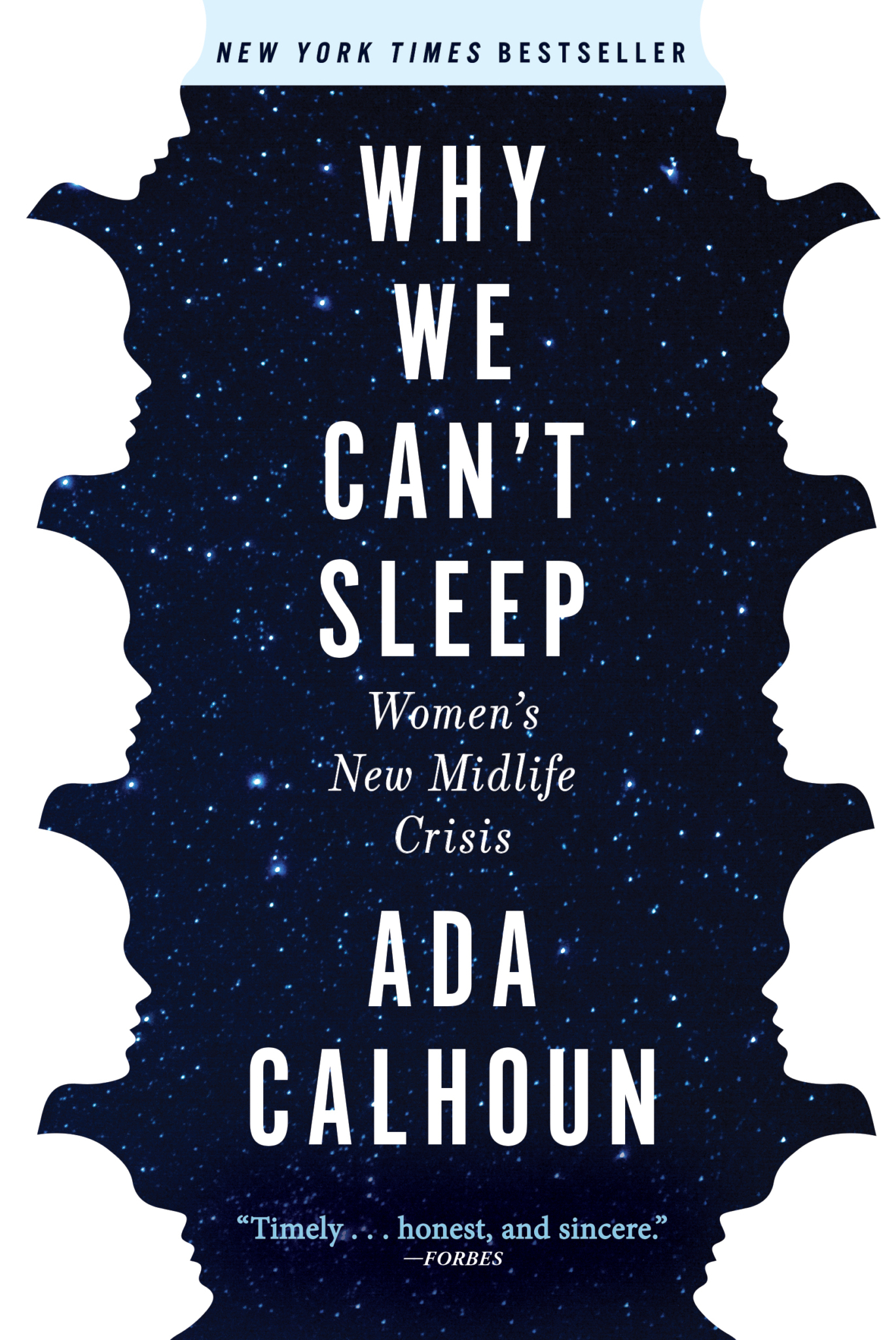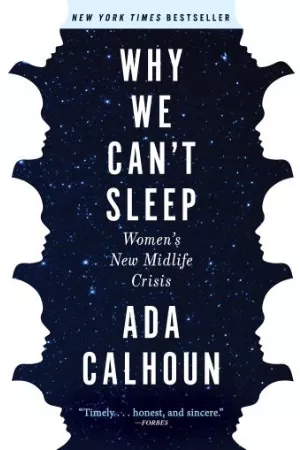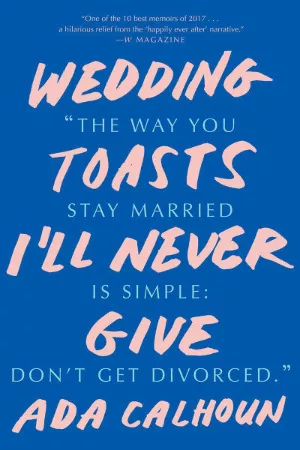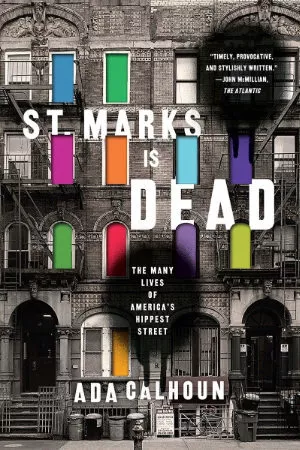Book Club Questions for Why We Can't Sleep!

Hello! I've been hearing about fantastic book clubs around the country that are reading Why We Can't Sleep; it warms my heart! The paperback out January 2021 has a new section at the back with book club discussion questions and answers to commonly asked questions. But some of you who are reading the hardcover or e-book, or listening to the audiobook, have emailed me to ask for those book club questions. I've just uploaded them as a PDF on the book's page. (It's right below the "Buy Now" button on the right.) I'll also paste them below. Thanks so much for reading! Drink an extra glass of wine for me! - Ada
Book Club Discussion Questions for Why We Can’t Sleep
1. What do you think of applying the term “midlife crisis” to women today? Is there another term you would use? Or do you think the situations described in this book qualify as a crisis?
2. The author writes that the ’70s and ’80s could be “a rough time to be a kid.” She cites the economy, the high crime rate, and the fact that, unlike Boomers, who got to engage in drug experimentation and free love, we were “the clean-up crew for parties we were too young to attend,” to quote a ’90s song. Do you agree?
3. Was there a chapter you particularly related to in the book?
4. Do you agree with Calhoun that the culture has routinely pitted us against one another as women—for example, those with children versus those without?
5. Was there a statistic that you found especially telling? Perhaps the one about how only one in four women of this generation is likely to out-earn her father? Or the fact that one in four women this age is on anti-depressants?
6. Do you agree with Calhoun that this generation of women was raised with unrealistic “having it all” expectations? And do you agree with some of the women she quotes who said they feel that they were “sold a bill of goods”?
7. Many women interviewed told Calhoun they were lucky and had no right to complain. These women often said this even if they were running themselves ragged caring for others, making the money for the household, and doing most of the housework. She argues that women in crisis often don’t give themselves permission to, say, get a sportscar, but rather fit their breakdowns in around the rest of their lives. Do you agree?
8. Calhoun insists that this is not a self-help book and that she avoids giving advice. However, she does encourage women struggling at this age to get more support—from other women their age and a good gynecologist, for example. And she encourages us to see that this is a period of time that will end. What advice would you add?
A Q&A with Ada Calhoun about Why We Can’t Sleep
Describe your book in brief.
When they were in their forties and fifties, our mothers and
grandmothers may have been parents or worked full-time jobs,
but they were more likely to be empty nesters at this age or
to work only 9-5. Meanwhile a whole lot of fortysomething
women are working more than full-time while raising young
children, tending to aging parents, being barraged by social
media—and going through perimenopause, all at once. And
because of the way we were raised, we tend to feel like we
can’t complain because we are lucky to have so many opportunities.
If we struggle to meet the demands we’ve placed on
ourselves we tend to blame ourselves for not working hard
enough.
What reaction have you gotten from readers?
Some people on Goodreads are mad it didn’t help them fall
asleep immediately because they thought it was a sleep guide.
Sorry, angry Goodreads reviewers. But most of the responses
have been “I feel less alone” or “I feel seen” or “This book
helped me let go of a lot of shame.” A lot of people have
found it a revelation that our expectations going into adulthood
were unrealistic. Turns out if you tell somebody, “Reach for
the stars, you can do anything” but you don’t give them any
support, you’re setting them up for failure and guilt.
What kind of reaction have you received from Millennials?
Gen X was the first downwardly mobile generation, but not
the last. Many millennials have told me that they’re working
so hard, and with so little guarantee of stability, that they’re
already burned out before they hit middle age and perimenopause.
I was glad to hear from a lot of young women that they
saw in us a valuable cautionary tale and resolved to set more
realistic expectations and to be kinder to themselves.
How did you find the women you spoke with?
This book came out of a story I wrote for Oprah.com in
2017. For that story and then for the book, I found people
through friends, calls sent out from large social media accounts
I had access to, experts in a variety of fields, and online message
boards, as well as at professional conferences, playgrounds, doctors’
waiting rooms, churches, and bars. It was important to
me that the demographic makeup of the book reflected the
racial, regional, and political makeup of the country. Women
of different backgrounds shared so many of the same cultural
touchstones and experiences. I heard some similar things in
the interviews: “What did I do wrong?” Maybe we didn’t do
anything wrong. Maybe the dice were loaded.
You were on book tour when the Covid-19 pandemic hit.
How did this affect the women you wrote about?
Middle-aged women were already doing most of the caregiving
in this country for children and aging parents. The coronavirus
has sent children home, and it’s menacing seniors more
than anyone else. So it’s now on us to keep our parents from
dying while learning how to homeschool, while either working
from home or dealing with a job loss and profound financial
insecurity. It’s a perfect storm of pressure. And yet, on p. 223
there’s an eerily prescient quote from the authors of a book
on generations about how 2020 would bring a world crisis and
this generation will save us. Perhaps because a lot of us were
latchkey kids, we are extremely resilient and were perhaps
well-equipped to hunker down, stay calm, and keep everybody
safe. We should be proud of ourselves.
What advice do you have for women struggling in midlife?
I try not to give advice as much as possible. Because one thing
we get a lot of is advice. And I think there is this self-help
industrial complex that leads us to believe that if we get the
right diet or the right chore chart that everything will fall into
place. It continues this idea that if we can’t fix our lives, it’s our
own fault. We think if we just work harder we’ll have money in
the bank. We’ll have health insurance. We’ll have the family we
want and the job we want. But there are other forces at work. I
think we need to understand that context before we can hope
to find true peace. But if pressed I guess I’d say: get off the
internet as much as possible because social media is designed
to make you sad, find a good menopause-trained gynecologist,
and start a club with other women your age.




